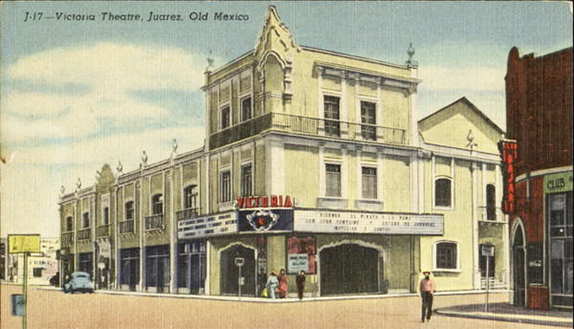
In the crisis-ridden rubble of downtown Ciudad Juarez, a group of citizens is arising to restore the cultural vitality and legacy of the Mexican border city. Called Juaritos de mis Recuerdos, or Juarez of My Memories, the year-old organization staged a demonstration August 4 in front of one of the historic buildings it proposes to rescue: the long-closed and decaying Victoria Theater on September 16 Avenue.
“This was the best theater in Ciudad Juarez,” retired teacher Marisela Campos told a small crowd. “Bit by bit, the historical places have been falling by the wayside.” Younger people, Campos lamented, “did not experience the magic of the theater.”
A native of the Mexican state of Durango who’s lived in Juarez since 1952, Campos challenged the long-held U.S. stereotype of Juarez as Sin City. She recalled the glory days of the three-story theater building decades ago, when the ballet, piano concerts, plays and movies made the Victoria Theater a center of high culture.
Nowadays, the Victoria Theater is an empty shell of its former shelf, littered with trash but still gleaming an elegant reminder of its past in the surviving columns of Talavera tile. Last week, a suspected arson attack charred the top floor, spurring Juarez of My Memories into action. In addition to rescuing the Victoria Theater, the group calls on authorities to save other buildings including the Hotel Del Rio, the Sauer Building, the Baptist Church on Avenida Juarez, the downtown bullring, Café La Nueva Central, and the San Jose Chapel, among others.
Javier Zarate, spokesperson for Juarez of My Memories, insisted that the city government counts on a budget to rescue the Victoria Theater but has not used the money. The day prior to the August 4 rally, Juarez Municipal Secretary Hector Arcelus Perez was quoted in El Diario de Juarez as saying that money from a special federal fund for the restoration of public spaces could not be spent on the Victoria Theater because the building is not formally a city property. FNS asked Zarate why residents should heed the historical preservation struggle, given the myriad of other serious issues in Juarez-economic, environmental and security, to name a few.
“It’s important because we are telling the citizen that he has a history to defend and retake, and from this place he can then go out safely with the family,” Zarate said. Knowing and defending local history aids in rebuilding the social fabric while educating people about their roots, he said. People who are cooped up at home are ultimately powerless to do anything, Zarate added.
In a leaflet passed out to motorists last weekend, Juarez of My Memories defined itself as a non-partisan, peaceful grassroots group that is not against the government.
The emblematic Juarez Market just down the block from the Victoria Theater is another place Zarate’s group is seeking to preserve. Once a favorite stop for El Pasoans and other foreign visitors, the fortunes of the Juarez Market have suffered tremendously in the past dozen years, clobbered by the successive crises of the post 9-11 border security expansion, multiple recessions and the Great Violence of 2008-2012.
On a recent weekend day, silence largely shrouded the rows of sales booths inside the big market building on September 16 Avenue. Outside, diners at a half-dozen patio tables enjoyed the muggy afternoon while a rock group performed. An eager waiter bounced around with a menu in hand to greet a visitor.
Despite hard times, the market is hanging tough, said Gabriel Cazarez, market secretary. “We’re going to enliven the Juarez Market,” Cazarez vowed. “We’re promoting events in the afternoons on the plaza,” especially folkloric dances and children’s activities on Saturdays, he detailed.
Currently, the Juarez Market is focusing on rebuilding a local, state and national customer base, as opposed to the old predominance of El Pasoans and U.S. tourists. “Right now, we’re working with the people from the city and the state and we will talk later to people from the U.S. ,” Cazarez added of his publicity plans.
Business is improving gradually, though at a slow rate, according to the market leader. The Juarez Market’s status as the only “artisan” market in the city gives it an enduring value, Cazarez said, adding that it is time for U.S. visitors to check out the offerings again. “I’d like to invite people to visit us,” he said. “The market is safe. It’s a safe city. Juarez has changed.”
Cazarez took over at the helm of market after his father, Ruben Cazarez, passed away in April 2012.
In a previous interview with FNS, the elder Cazarez remembered almost six decades of his life working at a place where large crowds, mariachis, celebrities and festive times greeted visitors.
The campaign to preserve Juarez’s historic sites inevitably rubs up against the downtown redevelopment project pursued by municipal and state officials. It’s not clear how saving landmarks will precisely fit into the larger plan, which is under challenge on various fronts. Recently, the Inter-American Development Bank reportedly suspended a pending $50 million loan for the project, which includes the removal of many old buildings and the construction of train underpasses, because it lacked a specific, authorized master plan.
Additionally, the Mexican Supreme Court is reviewing a legal challenge to the continuance of train traffic in downtown Juarez, which many citizens want rerouted to Santa Teresa, New Mexico.
“They are talking about a historic downtown, but they are destroying it,” is how Zarate assessed the ongoing redevelopment. Several years after the city began razing buildings on Avenida Juarez and adjoining Mariscal Street, the old red light district, empty lots and some new parking spaces are the only visible replacements to the old constructions.
Francisco Yepo, owner of Café La Nueva Central, was on hand to show his support for the August 4 demonstration and the historic preservation movement. “That’s why we are here, to make sure there are no more fires,” Yepo said in reference to the Victoria Theater. Yepo also has a very personal stake in downtown redevelopment.
Once targeted for demolition along with its neighbors, Café La Nueva Central, which is situated on the block next the downtown plaza and Cathedral, has been spared from the wrecking ball for now. Last year, hundreds of Juarenses rallied to save the popular restaurant and community gathering place when word hit the streets of a forced removal in the works.
Yepo said he and his neighbors have not had to resort to litigation, but still don’t have specific information about the city’s ultimate intentions for the block on which their businesses are built. “We’re defending the block. (Demolition) is suspended. We don’t know what’s going on,” he said.
The restaurateur said the public works project that has stretches of some downtown thoroughfares closed off for construction and sidewalks narrowed for pedestrians has aggravated a difficult situation for downtown businesses already reeling from a host of other problems.
A 24-hour business, Café La Nueva Central has lost clientele during the evening hours since potential customers opt to avoid the congestion and poor lighting of the redevelopment underway, according to Yepo.
“Nobody wants to go downtown at night,” Yepo said. Café La Nueva Central has not been forced to lay off workers, he added, but employees have seen their hours cut back because of the reduced customer flow.
The future of downtown redevelopment, the preservation of historic buildings and the cultural identity of Juarez will be hot issues awaiting the incoming mayor, Enrique Serrano, when he takes office in the fall. According to Javier Zarate, Juarez of My Memories plans to continue its campaign of educating residents about the history of their city and the need to preserve and refurbish historic landmarks for future generations.
(Creative Commons feature image via Flickr by Boston Public Library)




Responses to “Defending the History and Culture of Ciudad Juarez”